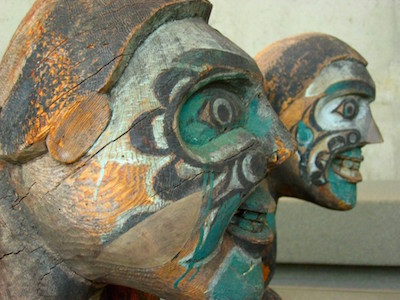
via Wikimedia Commons
“Man is an animal suspended in webs of significance he himself has spun,” writes American anthropologist Clifford Geertz. As such, anthropologists take it as their charge to help untangle this web and understand the connections that create such a web in the first place – a study of human behavior at the cultural level. Anthropology is referred to as “the science of humanity” and has roots both in the humanities and in the sciences.
The major itself is often subdivided into disciplines such as cultural anthropology, archaeology, linguistic anthropology, and biological anthropology, to name a few. Anthropologists generally study individual persons (as opposed to sociologists, who focus upon greater societal institutions), and the anthropologist’s primary written tool is ethnography, a qualitative exploration of cultural phenomena that involves surveys, interviews, and observations recorded in the process of conducting field work. The final product often involves a mixture of qualitative and quantitative data employed to illustrate and analyze cultural practices. While sociologists and anthropologists often butt heads concerning the scope and style of their discourses, the two often aim to explore related, if differing, aspects of the human condition, and both can equip undergraduates with broad but practical skillsets to apply in their professional careers.
A study performed in the year 2000 found that almost half of anthropology majors – around 46% – go on to do graduate studies rather then enter right in to the job market. Those that don’t – around 51% – tend to work in a wide range of occupations, from advertising and sales to business, clerical roles, and even catering. While anthropology majors are often tapped by large firms attempting to better understand their key demographics, many anthropologists, exposed to such a diversity of life and human nature, choose to pursue careers in helping people, in industries such as civil service and conservation.
Probably the strongest skill that comes about from majoring in anthropology is a particularly apt set of communication and interpersonal skills. The field work and ethnography that is fundamental to anthropology as a discipline necessitates an ability to speak comfortably and with ease in foreign and possibly uncomfortable situations. This might involve speaking to people you don’t know, asking them questions they don’t necessarily want to answer, and ingratiating yourself with cultures that aren’t always inherently accepting. The anthropologist has to balance between an effort towards objective viewing of subjects, and acting comfortably enough to gain the kind of depth of understanding with those cultures in order to create an effective ethnography. These type of interpersonal skills will likely help you ace any and all interview situations you find yourself in, and will help you quickly gain a sense of camaraderie with your newfound coworkers.
The communication that you do with subjects is closely tied the skills of investigation that are cultivated when studying anthropology. In some ways, conducting field work for anthropology isn’t so far of a cry from journalism and the investigation that is required when writing a story – both involve careful attention to detail and record-keeping. When you’re writing about the lives of individuals, there’s a lot at stake, and anthropologists are mindful of this. While the anthropologist is a trained observer when conducting fieldwork, there is also a strict methodology of investigation that is required of the working anthropologist. Ethnographies are not simply interviews, they are researches that are designed and conducted in a highly scientific and – as much as is possible – controlled manner.
Following the fieldwork, the critical thinking and analytical skills of the anthropologist come into play. The process involved in the crafting of ethnography is not dissimilar to that of a scientific experiment. It involves careful planning, theorizing, investigation and interviewing, and then synthesizing findings into a coherent exploration of a culture. The ability to explore these linkages between theory and reality is a skill developed by the anthropologist, but also one that is
All of these skills contribute to a finely tuned ethical compass for the anthropologist. Most anthropological endeavors are required to pass an ethics board of review for the type of investigation that is happening, the findings, and the claims being made about a particular group of people. The anthropologist, in trying to observe and write as objectively as possible about a group of people, is in a possibly powerful and dangerous situation. A strong moral compass in how to conduct these experiments, and how to depict the people being observed, is absolutely necessary for a student of anthropology, and will help to habituate a strong sense of ethics for life.
Many of the jobs typically pursued by students who study anthropology at the undergraduate level require postgraduate study in a specialized field. Some of these positions include archaeology, collegiate-level teaching, freelance consulting, or certain fields of applied anthropology. However, the skill set of an individual who has studied anthropology can equip one for an entry level position in:
Grant Writing
Median Pay: $49,000
The sharpened writing skills of an anthropology major can find one befitting of an entry level position working as a grant writer. The work of a grant writer involves proposing projects on behalf of an institution such as government, private, or non-profits in order to secure funding for projects from a trust or foundation. Having written ethnography as an anthropology undergraduate will likely come as great preparation for grant proposals, as both must be precise and detail-driven and follow a particular form. In addition, a grant writer must be extremely familiar with the project being proposing and to whom it is being proposed, a process that will be aided by the interviewing and field work skills developed as an anthropology major.

via Wikimedia Commons
Public Policy Analyst
Median Pay: $65,000
After studying different peoples and cultures close up for the last few years, anthropology majors can be well prepared for entry-level jobs in public policy. From taking a close and critical eye to cultures and people in particular, and conducting research according to a strict ethical code, anthropology majors often feel it is their obligation to enter public policy in order to shape laws that effect the very people they have studied for the better.
Paralegal
Median Pay: $40,000
The articulate writing and speaking powers of an anthropology major, combined with a history of conducting close and thorough research – especially about people – makes anthropology majors a smart choice for paralegal positions. In addition, a job as a paralegal can be hugely important for networking if you’re interested in law down the road.
| Office & Museum Assistant (Federal Work Study Only) Columbus State Community College Columbus, OH | View |
| Archeological Field Technician ASC Group Columbus, OH | View |
| Data Entry Clerk - Work Remotely Recruit Monitor Columbus, OH | View |
| Remote Data Entry Clerk NoGigiddy Columbus, OH | View |
| Amazon Warehouse - Shopper Team Member $16-$35/hr Amazon Columbus, OH | View |
| Work From Home-Online- Hotel Reservationist/Entry Level Destination Knot Columbus, OH | View |
| Data Entry Clerk Work From Home - Part-Time Focus Group Participants ($750/Week) Apex Focus Group Columbus, OH | View |
| Warehouse Person (Full Time/Part Time Loader) - PepsiCo $16-$35/hr Pepsi Columbus, OH | View |
| $375 Paid Every 2 days/Work From Home!!! RemoteOnline Columbus, OH | View |
| Work From Home Data Entry , Earn $1400 Per Week alljobs Columbus, OH | View |